Allen handled the job extremely well.
At a first reading the book fairly glitters. As Burroughs lived through
the period he must have read the book with different eyes than one of a
later generation, like myself, reading about the period. As with
any introduction to a period such a book requires several readings to properly
understand it. I read it for the fourth and fifth times for this
essay.
The first time I read it I was blinded by the
light, breathless all the way through. Over the years I began to
develop some knowledge of the period but my second reading was almost as
dazzling as the first although I began to be disquieted by Allen's handling
of the Bolshevik-super-patriot confrontation of 1919 through 1924.
By my third reading I had real misgivings concerning his treatment of the
subject, it seemed too one sided, too unbalanced. I began to read
carefully through his essay of sources. I was surprised to find that
his research was more significant to his book than his memory. He
wasn't actually recalling the times, many incidents of which he probably
had only the sketchiest memories, but he was writing from a program, in
other words Only Yesterday is a propaganda tract.
In fact he based his whole description of the
super-patriots on a series of articles by someone called Sidney Howard
written in 1924 just at the time of the revision of the Immigration Laws
which severely restricted immigration while setting the quota basis as
that of the number of nationalities in the US as of 1890. This would
have the effect of severely limiting immigration from Eastern and
Southern Europe where most of the 'toxic effluvia' mentioned by Burroughs
in Girl From Hollywood would have come from in the estimation of
the times.
By the third reading I became interested in
this series of articles by Howard obtaining copies. As I suspected
Sidney Howard was defaming and savaging those people most ardent for the
limitation of immigration. While it is not well known it is nevertheless
true that before the Great War interrupted immigration the Jews had spent
millions preparing to transport the entire Jewish population of the Pale
of Settlement to the United States. Rather than have the five million
plus enter through the Atlantic ports where opposition was certain the
Southern ports of New Orleans and Galveston were organized to quietly accept
the immigrants.
Mr. Howard's violent response to the super-patriots,
which term by the way is a defamation in itself equivalent to, say, the
term kikes, was based on the failing of this plan. Sidney Howard
was of course Jewish having emigrated to the United States from Germany
twenty years before.
How much of this plan Burroughs may have known
isn't clear or that he knew, however it is not impossible that someone
as well informed as he did know. Certainly the rushing through of
the immigration revision was because the plan was known and the influx
of another five million Jews was unwelcome. An unpleasant fact, perhaps,
but history is history. Now, these are just facts which are available
to anyone with the inclination to search so don't blame me for telling
the truth.
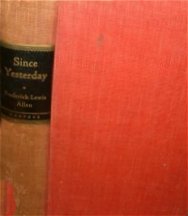 At any rate my discovery of the way Allen used his sources cast doubt on
the objectivity of his book which I now began to see as a partisan effort
different only in tone to that of Mr. Howard. My most recent reading
has convinced me that Frederick Lewis Allen was part of the Red/Liberal
coalition. Still an excellent introduction to the period. Allen
was a talented writer with a very good mind. He followed Only
Yesterday with Since Yesterday, a history of the thirties, good
but not so interesting. While Mr. Allen could view with alarm concerning
the Big Red Scare he didn't see the even more alarming antics of Roosevelt,
a member of his own camp, in the same light.
At any rate my discovery of the way Allen used his sources cast doubt on
the objectivity of his book which I now began to see as a partisan effort
different only in tone to that of Mr. Howard. My most recent reading
has convinced me that Frederick Lewis Allen was part of the Red/Liberal
coalition. Still an excellent introduction to the period. Allen
was a talented writer with a very good mind. He followed Only
Yesterday with Since Yesterday, a history of the thirties, good
but not so interesting. While Mr. Allen could view with alarm concerning
the Big Red Scare he didn't see the even more alarming antics of Roosevelt,
a member of his own camp, in the same light.
His last book, The Big Change, written
in 1950 was a dour look back at the changes wrought by the previous fifty
years. I would have to reread it to make comments.
So, ERB under siege in Opar by the Reds bought
his copy of Only Yesterday I would imagine on its issuance.
It was that kind of book. Sensational in its day it has been reprinted
continuously being available in more than one edition today.
A large part of the glitter was the attention
Allen paid to flag pole sitting and gold fish swallowing crazes which really
stand out at the first reading. Allen covers extensively a number
of other topics of a more serious nature which would have been very relevant
to ERB while I'm sure he would have objected to their overly sympathetic
treatment by Allen.
Certainly the Harding scandals would have been
of great interest. The famous Elk Hills and Tea Pot Dome oil scandal
would have keenly interested ERB. As, and this is pretty amazing
to me, ERB apparently did not speculate in stocks he came through the crash
unscathed except for his involvement in the Valley airport and the Apache
airplane engine but those properly speaking had nothing to do with
the stock market crash.
Apparently his friend Herb Weston was also
uninvolved as the crash doesn't even figure in their correspondence which
was recently published. Seems odd, doesn't it?
However given his trouble with the Reds as
evidenced by Tarzan The Invincible I am sure that the chapters on
1919 and The Big Red Scare held the greatest interest for him. For
that reason in this essay I am going to ignore the rest of Only Yesterday
and concentrate on those two chapters. Any criticism of Allen's methods
or opinions are no reflection on the overall quality of the book.
If you are a full fledged Liberal or 'fiscally conservative, socially liberal'
you will undoubtedly have a greater problem with my conclusions wondering
how I could find anything to criticize in Frederick Lewis Allen.
Realists and Conservatives, I hope, will prick up their ears.
I am unaware of what Burroughs or Allen knew
of the more hidden aspects of matters at the time. Burroughs was
resentful at the results of immigration, that much is clear, while Allen
was part of the Liberal/Red/Immigrant Coalition.
Not wanting to go too far, suffice it to say
that Woodrow Wilson and his administration was Liberal with strong socialist
tendencies. Wilson's main objection to Bolshevism was that it was
a competitor of his system or a rival religious belief. Many socialistic
goals were put into practice under cover of the war as, for instance, the
nationalization of the railroads. There was some question whether
they would privatize ownership after the war while other industries, such
as coal mining, were subject to the nationalizing pressures.
More serious even than nationalization of industry
was the attempt to reduce all society to one class with no differences.
Liberal circles, Jane Addams of Hull House in Chicago for instance, believed
that there could be no true equality until all people wore the same clothes.
This is a fact. I am not interested here as to whether such sameness
was possible I am only relating the facts. Therefore, the WIB, War
Industries Board, under the administration of Bernard Baruch, following
directions from Wilson, had organized plans to limit the available clothing
to two or three styles and shoes of the same quality thereby making people
dress alike with no difference in style or quality. This is really
extraordinary. As Baruch says in his autobiography, they would have
done it too but the war ended too soon.
You don't read about this stuff in the history
books, and you're not going to either, you have to dig it out. But
this plan was not secret but known by others at the time, Henry Ford
for instance. Now you know why Ford was so viciously defamed.
Ford, the Dodge brothers and manufacturers in general had real problems
with the War Industries Board. Ford was demonized while both the Dodges
died mysterious deaths in 1920.
In Something
Of Value Part II went into some detail about Freud and the Revolution
as the Jewish Messiah. This revolution was to take place between
1913 and 1928. So the Messianic Revolution would have been imagined
to be in full swing during the years 1918 to 1924 with success apparently
imminent.
Ford objected to the preference shown the Jews
by Wilson. Just as Wilson undercover of the war was trying to implement
his socialistic goals so the Jews undercover of the war were working to
implement their revolution.
Ford, among others, saw this which resulted
in his purchasing the Dearborn Independent and publishing analyses of Jewish
activities both in the US and abroad. These articles are usually
defamed as anti-Semitic lunatic essays but they aren't. Actually
Ford amassed a huge library of volumes concerning Jewish history, religion
and activities. All his articles were carefully researched, fully
documented and lucidly written. They weren't written by Ford but
by his assistant William Cameron who had no axe to grind.
After Ford was discredited as an anti-Semite
he asked the B'nai B'rith what he was supposed to do with this, to me as
a researcher, fabulous library. The Brotherhood suggested he donate
it to the Jewish Theological Seminary in Cincinatti. Ford could only
roll his eyes in disgust. As far as I know no one knows what became
of the library but this 'dangerous anti- Semitic' material was not donated
to the Jewish Theological Seminary in Cincinatti.
Another very interesting subject of the period
was the Balfour Declaration but as that was between Britain and the Jews
I leave it you to research if you're interested. Good story, though.
For whatever reason Allen ignored Ford's story
which ran from 1920 to 1927 before Ford threw in the towel. The story
was very important to the Coalition. This is a significant omission
in The Big Red Scare chapter of Only Yesterday.
As I mentioned in passing in An Empire Of
His Own and more fully above, the Jews just prior to the War had organized
the migration routes from the Pale of Settlement to Hamburg, Germany from
whence most of the immigrants embarked for the US, to transport the entire
five million or so to America. Just as the post war exodus from Europe
was being organized immigration restrictionists succeeded in slamming the
door leaving the five million where they were.
Once again Lewis ignores an important topic
concentrating only on portraying the Bolshevik threat as a fantasy while
belittling and defaming the 'super-patriots.' As his only source
for this condescension he used the series of articles that appeared
in the New Republic, itself a Communist magazine, in 1924. Sidney
Howard's articles are intemperate, vituperative and inflammatory as one
might expect from a revolutionary writer who is trying to reverse the immigration
laws of 1921 and 1924 so as to permit the fulfillment of the plan to transfer
his people from the Pale. Needless to say Mr. Howard's articles failed
to reverse the immigration policy although they did succeed in blackening
the names of his victims.
This then is the
background against which Allen presents his arguments. I have no
doubt that Mr. Allen's intent was to be benevolent, as I'm sure all Liberals
think they are, but just because you believe you're doing the right thing
doesn't mean you are. Just because one apposes a mistaken benevolence
doesn't make one malicious, one can be equally as benevolent or more so
but in a different manner. There are two or more sides to a story
unless you're a Liberal and then there is only one. God help the
dissenters.
I hope the above will clarify my opinions on
Allen's understanding of the period. I have no doubt that he is being
coy, while on the other hand there is no reason for either he or Burroughs
to have a full understanding of what was happening. It should be
noted though that Allen admits any objections of his opponents merely discounting
them as folly.
Let it be said of Burroughs, whatever his private
feeling may have been, that he had the good sense to steer clear of anything
that might have been construed as anti-Semitic. Perhaps he learned
from the Ford imbroglio but he seldom mentions Jews by name. Certainly
he must have been aware of the accusation of Jewish involvement in the
Bolshevik revolution and Jewish activities in the US from at least 1913
to 1924, yet when he wrote the Moon Men he portrays his sole Jew
as the kindest and most benevolent of men. The picture seems a little
overdrawn to me but I don't want to read anything into the episode.
He may have been watching Ford. Suffice it to say that Burroughs
knew when a battle could only end in disaster as it had for Ford.
ERB has a clear record as far as any charges of anti-Semitism go.
2.
In explicating the events of 1919 to 1924 one
can't expect Mr. Allen's facts to be wrong. However the selection
of facts and their interpretation do falsify his conclusions. After
all if you're writing history facts themselves are unavoidable. As
Mark Twain is reported to have said: Everyone is entitled to their
opinion but not their facts. Mr. Allen takes all the usual
Red/Liberal dodges to discredit his opponents, which is to say defame them
as weak minded fools while misrepresenting Red/Liberal intents and involvement.
I grant him his facts.
According to Allen the Bolshevik threat was
minimal and no cause for either alarm or reaction because it was nominally
unsuccessful, hence what is defeated is never a threat. You know
how it is, you defuse a bomb and it is no longer a bomb and hence was never
a threat.
Of the people who made the effort to defuse
the threat Allen says, p. 45 (First edition, first printing):
They seriously thought - or at least
millions (of Americans) did, millions of otherwise reasonable citizens
- that a Red revolution might begin in the United States the next month
or next week, and they were less concerned with making the world safe for
democracy than with making America safe for themselves.
Were millions
of Americans unreasonable or were they diffusing the threat before it materialized?
This is a partisan issue but that as may be I obviously believe they took
the necessary precautions and thank them for it. Nor do I disparage
them for caring less to make the world safe for democracy than making
America safe for themselves. It is almost necessary to ask what
kind of fool was Allen.
Allen argues that since the actual numbers
of Communists within the borders of the united States was small it follows
that they couldn't have been a threat. He neglects to point out that
the number of Communists in Russia at the time the Bolsheviks seized power
was even smaller than in the United States and yet this 'small band of
brothers' was able to exterminate any who refused to accept their
ridiculous agenda to the tune of tens of millions. Why argue that
'it couldn't happen here?' The Reds would reverse even that opinion
after Hitler arguing that 'it could happen here' necessitating the liquidation
of 'Fascist elements.' Allen must have know the fallacy of his argument.
I no longer have any confidence in his integrity.
The Communist revolution could have happened here
which is what Burroughs argues. His novel The Moon Maid is a story
of when 'it did happen here.' A better novel, I might add, than Sinclair
Lewis's It
Couldn't Happen Here.
When that 'harmless romantic poet' Kurt
Eisner at the head of a miniscule Bavarian Communist element seized
power how numerous was his party? Miniscule, do I repeat myself,
why then I repeat myself, as were the Communists led by Bela
Kun in Hungary.
So this standard dodge of the defamers is nonsense.
What is necessary is for these small cadres to create the appropriate climate
in which a highly organized, coordinated, dedicated band can seize control.
The ideal climate in Russia, Bavaria, Germany and Hungary was created by
the Great War and its aftermath.
The attempt to create a similar environment
in the United States was made by the tremendous wave of strikes and bombings
during The Big Red Scare.
In a second standard Red/Liberal dodge Allen
argues that it can't be proven that the strikes and bombings were led by
Communists, anarchists, socialists or radicals.
At the same time he says, p. 47:
The Socialist party
watching the success of the Russian revolution, was flirting with the idea
of violent mass-action. And there was too, a rag-tag and bobtail
collection of Communists and anarchists, many of them former Socialists,
nearly all of them foreign born, most of them Russians, (read Jews) who
talked of going still further, who took their gospel direct from Moscow
and, presumably with the aid of Russian funds, preached it aggressively
among the slums and factory-town population.
Thus while contradicting himself at least
we have the comfort of knowing that these totalitarians were only a 'rag-tag
and bobtail collection.' Humph! Very contemptible. It
is fruitless to argue these points but if bomb-throwers and fomenters of
labor discontent weren't Communists, anarchists and radicals, then who?
It is true that as a piece of propaganda a
book has to be reasonably short because most people don't like to read
long books, three or four hundred pages equals the attention span
of the average reader. That's about mine; I resent nothing
more than a long winded writer, like myself, who rambles on for a thousand
closely packed, small print, 10" by 6" pages. On the other hand you
can't really do an effective job in less than a thousand pages. Anyone
who can write his autobiography in less than two thousand pages has either
had his memory banks shorted out or doesn't know how to write his story.
But I digress.
As a piece of propaganda Only Yesterday
is very effective. While I was dazzled by it I strangely remained
unconvinced. I would imagine that Burroughs who was not of the Red/Liberal
persuasion read it with the same jaundiced eye.
After making excuses for the radicals Allen
finds fault with their opponents. And there was the problem with
Allen's history. He had taken sides; while trying to dissimulate
it he was for the Reds. Even though he didn't put it into these
words he though that resistance to the Reds was immoral. Allen was
of the Red faith or belief system.
Thus he characterizes the 'super-patriots'
in this manner, p. 46:
It was an era of lawless
and disorderly defense of law and order, of unconstitutional defense of
the constitution, of suspicion and civil conflict - in a very literal sense
it was a reign of terror.
That is certainly one way of looking at it.
Having granted his facts, his opinions are skewed. Perhaps a better
description might be a period of undeclared martial law necessary to protect
law and order. How Mr. Allen could if not excuse at least ameliorate
the series of bombings he himself describes culminating in the incredible
Wall Street blast and then describe the necessary reaction as a reign of
terror boggles the imagination.
One imagines that ERB reading this tripe in
1931-32 when he himself was under attack by Red terrorists snorted in disbelief
and disgust. What reasonable, informed, balanced person wouldn't?
Really, for all his seeming cool detachment
FLA was off the deep end. Just as his kind would be in the American
defence against the Reds after WWII would be. In fact none of the
arguments and strategies changed. In 1954 and in 1920 when the defense
had been made in the former case by Senator
McCarthy and in the latter case by the Attorney
General A. Mitchell Palmer both men were slandered into oblivion.
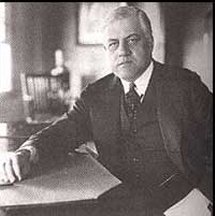
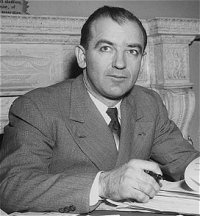 ERB had a vested interest in reading Allen's popular
history which must be why this volume so out of consonance with this collection
found its way there.
ERB had a vested interest in reading Allen's popular
history which must be why this volume so out of consonance with this collection
found its way there.
A careful examination of ERB's
library may turn up other surprises. The recent issue of the
correspondence between ERB and Herb Weston has given us additional insight
into the nature of ERB's thought processes. Now, if we could get
Danton Burroughs to release additional correspondence, say, between ERB
and Bob Davis and his publishers we might be able to bore further into
the mental processes of the real ERB.


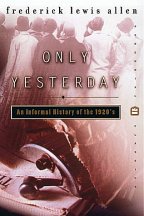
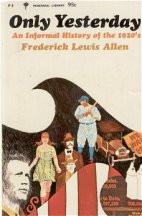

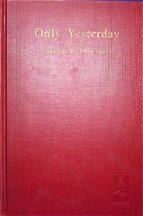

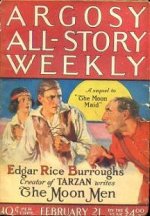
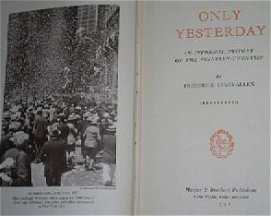
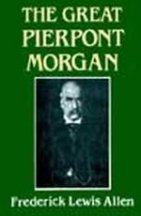
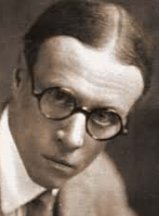
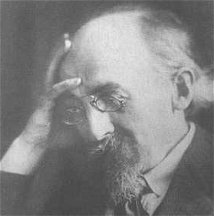
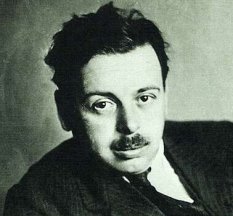
![]()
![]()
![]()
![]()
![]()
![]()

![]()